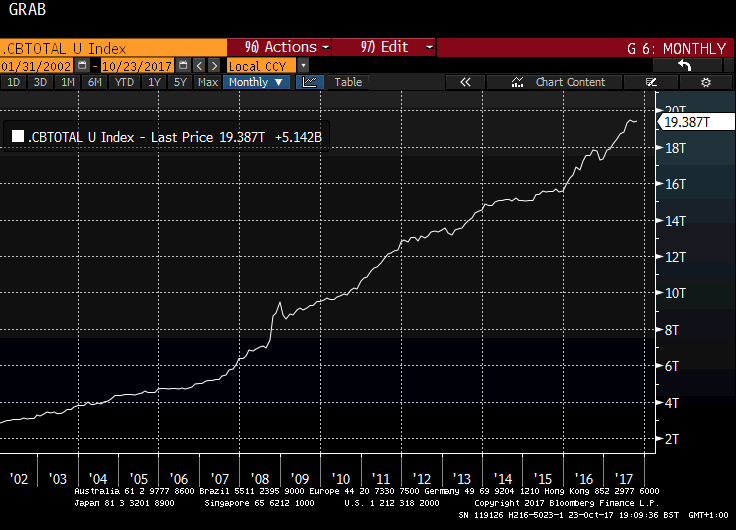Macro Morsels October 17th 2017
Thanks to a subscriber for this report from R. Harding at Maybank which takes a cautionary tone in this issue. Here is a section:
As the Federal Reserve just recently reported, while the mainstream media continues to tout that the economy is on the mend, real (inflation-adjusted) median net worth suggests this is not the case overall. As stated, the recovery in net worth has been heavily skewed to the top 10% of income earners
Of course, this explains why the largest number of the population over the age of 65 is still employed as they simply can't afford to retire.
The multi-generational households are on the rise, not by choice but by necessity. These are long-term headwinds that suggest economic growth will remain weak, and the rise in delinquencies, slow-down in auto demand, and weak retail sales all suggest consumers may have reached the limits of the debt-driven consumption cycle for now.
In other words, individuals are ratcheting up debt, not to buy more stuff, but just to maintain their current "standard of living."The disconnect between the stock market and real economic growth can certainly continue for now. Exuberance and confidence are at the highest levels on record, but the underlying stories are beginning to weave a tale of an economy that is very late in the current cycle.
Importantly, these are not short-term stories either. The long-term picture for the economy and the markets from the three biggest factors (Debt, Deflation, and Demographics) continues to build. These factors will continue to weigh on economic growth, and market returns, during the next generation as the massive wave of baby-boomers shift from supporters to dependents of the financial and welfare system.
Here is a link to the full report.
Quite apart from Federal Reserve figures we also know that a significant majority of Americans have not participated in the economic recovery to any measurable extent because of the success Donald Trump had in tapping into resentment in the Presidential election a year ago.
More than any other factor that is likely to influence the Fed’s decision in how quickly to raise interest rates. The 2-year yield is now pricing in one rate hike between now and late 2019, up from none in August. That still reflects a great deal of skepticism they will be able to raise rates while also reducing the size of the balance sheet without running into economic trouble.
Meanwhile, since Trump likely wants a dove at the Fed, the strongest likelihood is that he will reappoint Janet Yellen as chair, at least in my opinion.

Provided the flow of liquidity from central banks, globally, continues to trend higher, the benefit of the doubt can still be given to asset price inflation which is of course positive for stock markets over the medium-term despite short-term risk of a consolidation.


